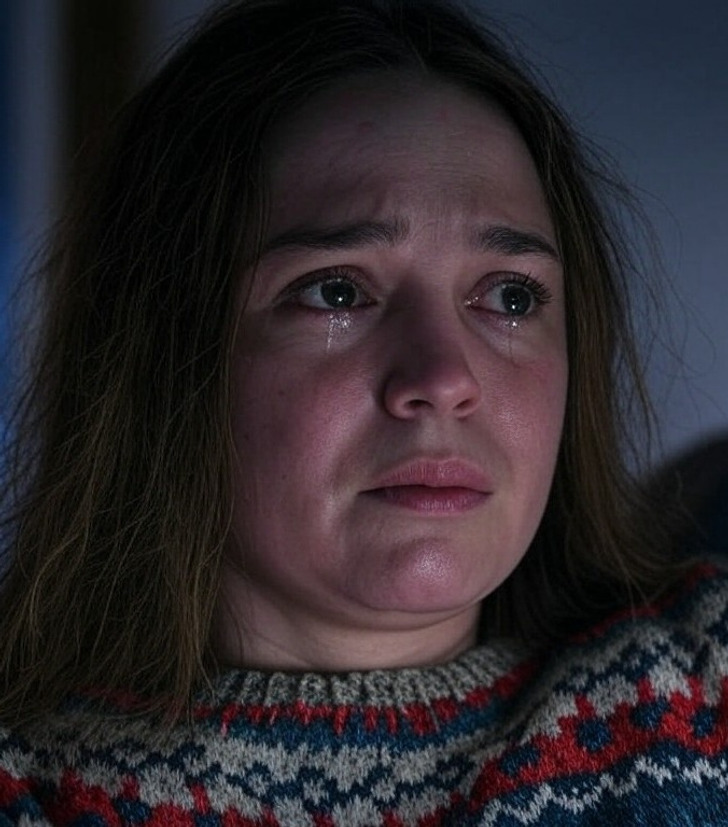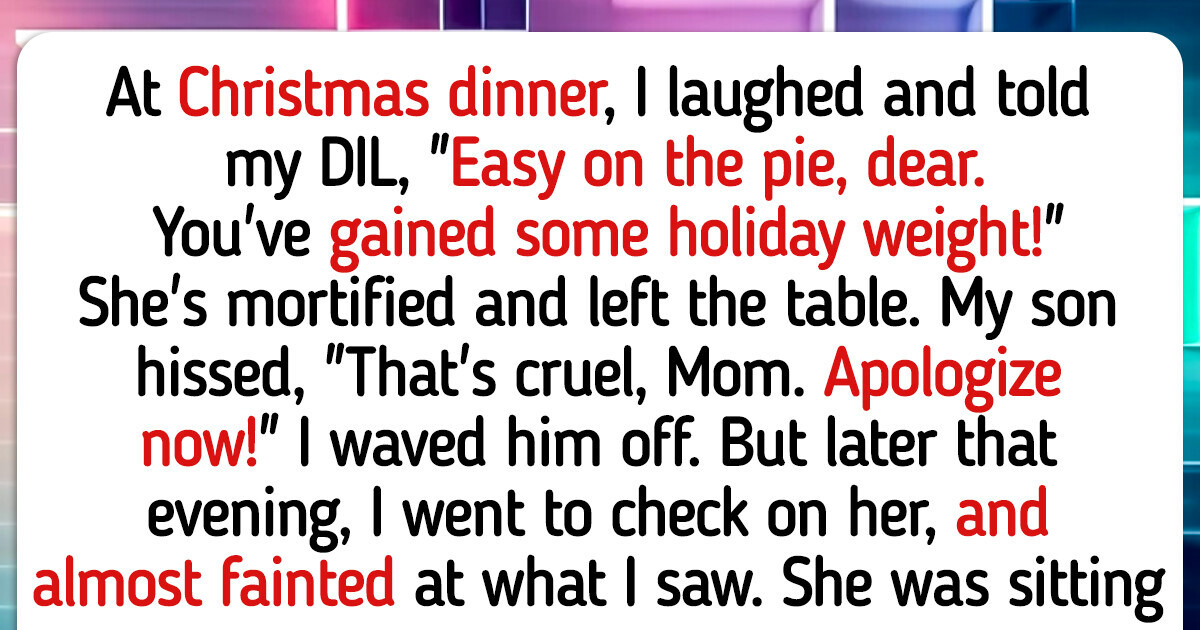I Commented on My Daughter-in-Law’s Holiday Weight Gain—Now She’s Furious / Bright Side
Holidays are a time for laughter, love, and family—but sometimes, a single moment can turn festive cheer into tension. Frances reached out to us with a heartfelt letter about a Christmas dinner gone awry. What began as a joyous gathering ended in hurt feelings and a fractured family dynamic.
Her story is one many can relate to, and it’s a reminder of how words can carry unexpected weight. Before we dive into our advice, let’s take a closer look at Frances’s account of what happened.



Frances, your letter struck a chord. The holidays are often seen as a time for joy and togetherness, yet, as your story shows, even a single moment can unravel the harmony of a family gathering. You’ve written to us for perspective, and we’re here to offer empathy, honesty, and clarity. Let’s unpack this situation and try to uncover the lessons it holds for you—and for anyone navigating the tricky dynamics of family relationships.
Understanding the Weight of Words

Frances, words hold weight—especially in close-knit settings like family. The holidays magnify emotions, turning light-hearted remarks into potential landmines. Your comment about Emma’s weight, though intended as a joke, struck a nerve. It wasn’t just about her going for a second slice of pie; it was about how she’s felt judged by you over time.
When you’re part of someone’s inner circle, your words carry a unique power to either uplift or wound. Even casual remarks can leave lasting impressions, especially when they touch on sensitive areas like body image. Humor, while often a bridge in relationships, can sometimes act as a barrier when misjudged. Emma’s reaction suggests this wasn’t an isolated moment for her.
It’s a reminder that familial bonds thrive on mutual respect and understanding, and the dynamics of humor require careful navigation to ensure they build rather than break connections.
Recognizing Patterns Beyond the Incident

Your daughter-in-law’s reaction—packing her suitcase and leaving—points to a history of feeling undermined. Emma’s comment about “little digs” speaks volumes. Whether it’s her weight, cooking, or career, these remarks seem to have accumulated over time, eroding her sense of belonging. Such moments, when repeated, can snowball into feelings of exclusion and frustration. It’s easy to dismiss this as oversensitivity, but her feelings are valid and reflect a deeper narrative.
Reflecting on past interactions can provide clarity: Were there moments where your playful teasing might have crossed a line? It’s not about assigning blame but understanding how patterns evolve over time. Acknowledging these patterns doesn’t mean you’re a bad person; it means you’re open to growth and willing to foster an environment where everyone feels valued and respected.
When Jokes Become Barriers

We get it: humor can be a way to bond and keep things light. But, Frances, jokes about sensitive topics often come at a cost. Emma’s weight is her personal territory, and commenting on it, even in jest, can feel invasive. Imagine being on the receiving end of such remarks during a family gathering.
Would it feel like a loving nudge or a spotlight on your insecurities? For Emma, this might have felt like a public airing of something deeply personal. Humor in families should foster connection, not alienation. It’s important to distinguish between playful teasing and comments that might touch on sensitive areas.
As a matriarch, your role is pivotal in setting a tone of warmth and inclusivity. Ask yourself: Was the laugh worth the fallout? Understanding the fine line between bonding and hurting can transform how family interactions unfold, ensuring everyone feels cherished rather than scrutinized.
The Role of Apologies in Healing

Your son David’s plea to apologize immediately wasn’t just about defusing tension; it was about acknowledging Emma’s pain in real time. A genuine apology can act as a bridge when relationships feel fractured. Apologies aren’t just about saying “sorry”; they’re about recognizing the other person’s feelings and showing a willingness to change. When you waved him off, it likely deepened the hurt for both him and Emma, as it signaled a lack of acknowledgment.
It’s not too late to make amends. Reach out to them with sincerity, ensuring your words reflect both regret and understanding. Express that you’re sorry not just for the comment, but for the patterns Emma brought up. Show her—and David—that you’re listening and willing to change. Such efforts, when genuine, can pave the way for reconciliation and renewed trust within the family.
Rebuilding Trust and Connection

Healing takes effort and time, Frances. Start by reframing how you engage with Emma moving forward. Shift from playful critique to genuine appreciation. Compliment her strengths and let her know she’s valued as a part of the family.
Relationships flourish in environments of trust and encouragement. Encourage open conversations where grievances can be addressed without judgment or defensiveness. This doesn’t mean losing your personality; it means tailoring your humor and remarks to build Emma up rather than risk tearing her down.
Small gestures of kindness can go a long way, whether it’s a heartfelt note, an inclusive family activity, or simply listening more intently. Trust can be rebuilt, but it requires consistent effort and a willingness to adapt to each other’s boundaries and needs.
Moving Toward Understanding

Frances, your letter reflects a mother-in-law who genuinely cares but may have misjudged the impact of her words. The good news is that family bonds, though tested, can often be repaired. Start with an apology, follow it with understanding, and commit to creating a more inclusive and supportive environment. Humor, when paired with kindness, can be a tool for unity rather than division.
Reflect on how your words and actions can serve as a foundation for connection rather than conflict. Remember, it’s never too late to learn, grow, and nurture the relationships that mean the most to us. Your willingness to reflect and adapt shows that positive change is not only possible but within reach.
As you think about strengthening those bonds, why not take a break and recharge with some holiday movies? Check out our list of films that are perfect for cozying up and finding some lighthearted inspiration. Click the link to discover new favorites and make your New Year truly memorable!


